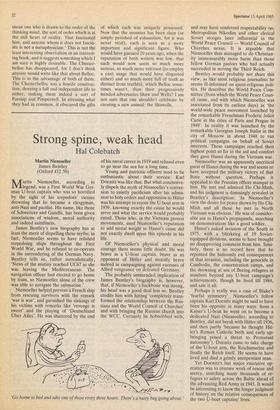Strong spine, weak head
Hal Colebatch
Martin Niemoeller James Bentley (Oxford £12.50)
martin Niemoeller, according to legend, was a First World War Ger- man U-boat captain who was so horrified by the sight of his torpedoes' victims drowning that he became a clergyman, anti-Nazi and pacifist. His name, like those of Schweitzer and Gandhi, has been given associations of wisdom, moral authority and indeed saintliness.
James Bentley's new biography has at least the merit of dispelling these myths: in fact, Niemoeller seems to have relished torpedoing ships throughout the First World War, and he refused to co-operate in the surrendering of the German Navy. Bentley tells us, rather surrealistically, 'News of the mutiny reached UC67 as she was leaving the Mediterranean. The navigation officer had elected to go home by train, so Niemoeller alone of the crew was able to navigate the submarine.'
Niemoeller helped prevent a French ship from rescuing survivors with the remark 'war is war', and garnished the sinkings of his victims with remarks like 'revenge is sweet' and the playing of 'Deutschland Ober Alles'. He was shattered by the end of his naval career in 1919 and refused even to go near the sea for a long time.
Young and patriotic officers tend to be enthusiastic about their service. Karl Doenitz was like that. But what conclusive- ly dispels the myth of Niemoeller's conver- sion to saintly pacificism after his admis- sion to holy orders and opposition to Hitler was his attempt to rejoin the U-boat arm in 1939, knowing exactly the cause he would serve and what the service would probably entail. Those who, in the Vietnam protest movements, used Niemoeller's reputation to add moral weight to Hanoi's cause did not exactly dwell upon this episode in his life.
Of Niemoeller's physical and moral courage there seems little doubt. He was brave as a U-boat captain, brave as an opponent of Hitler and morally brave indeed in campaigning against excesses of Allied vengeance on defeated Germany.
The probably unintended implication of James Bentley's biography is, however, that, if Niemoeller's backbone was strong, his head was a good deal less so. Bentley credits him with having 'completely trans- formed the relationship between the Rus- sians and the World Council of Churches' and with bringing the Russian church into the WCC. Certainly he hobnobbed with, 'Go home to bed and take one of these every three hours. There's a nasty bug going about.' and may have conferred respectability on, Metropolitan Nikodim and other clerical Soviet stooges later influential in the World Peace Council — World Council of Churches nexus. It is arguable that Niemoeller thus managed to do Christian- ity immeasurably more harm than those fellow German pastors who had actually succeeded in serving the Third Reich. Bentley -.would probably not share this view, as like most religious journalists he seems ill-informed on quasi-religious poli- tics. He describes the World Peace Com- mittee (from which the World Peace Coun- cil came, and with which Niemoeller was associated from its earliest days) as 'the world-wide peace movement launched by the remarkable Frenchman Frederic Joliot Curie in the cities of Paris and Prague in 1949'. In reality it was launched by the remarkable Georgian Joseph Stalin in the city of Moscow in about 1948 to run political campaigns on behalf of Soviet interests. These campaigns reached their highest point so far in the aid and comfort they gave Hanoi during the Vietnam war.
Niemoeller was an apparently uncritical guest of Hanoi during the war and seems to have accepted the military victory of that State without question. Perhaps it appealed to the Prussian officer manqué in him. He met and admired Ho Chi-Minh, and his judgment is damningly revealed in Bentley's description: 'In Niemoeller's view the desire for peace shown by Ho Chi- Minh and all those he met in North Vietnam was obvious.' He was of consider- able use to Hanoi's propaganda, marching on demonstrations like a good soldier.
Hanoi's naked invasion of the South in 1975, with a blitzkrieg of 19 Soviet- equipped divisions, seems to have brought no disapproving comment from him. Simi- larly, there is no record here that he repented the hideously evil consequences of that invasion, including the genocide in Cambodia, the concentration camps, and the drowning at sea of fleeing refugees in numbers beyond any U-boat campaign's achievements, though he lived till 1984, and saw it all.
Perhaps it really was a case of Blake's 'fearful symmetry'. Niemoeller's fellow captain Karl Doenitz might be said to have been his opposite in many ways: from a Kaiser's U-boat he went on to become a dedicated Nazi (Niemoeller, according to Bentley, did not break with Hitler till 1936, and then partly 'because he thought Hit- ler's Roman Catholic birth and early up- bringing posed a threat to Protestant autonomy'). Doenitz came to take charge of the U-boat arm, the Reichsmarine and finally the Reich itself. He seems to have lived and died a grimly unrepentant man.
Yet Doenitz's last major executive op- eration was to oversee work of rescue and mercy, snatching many thousands of re-
fugees to safety across the Baltic ahead of the advancing Red Army in 1945. It would be interesting to know the longer judgment of history on the relative consequences of the two U-boat captains' lives.














































 Previous page
Previous page